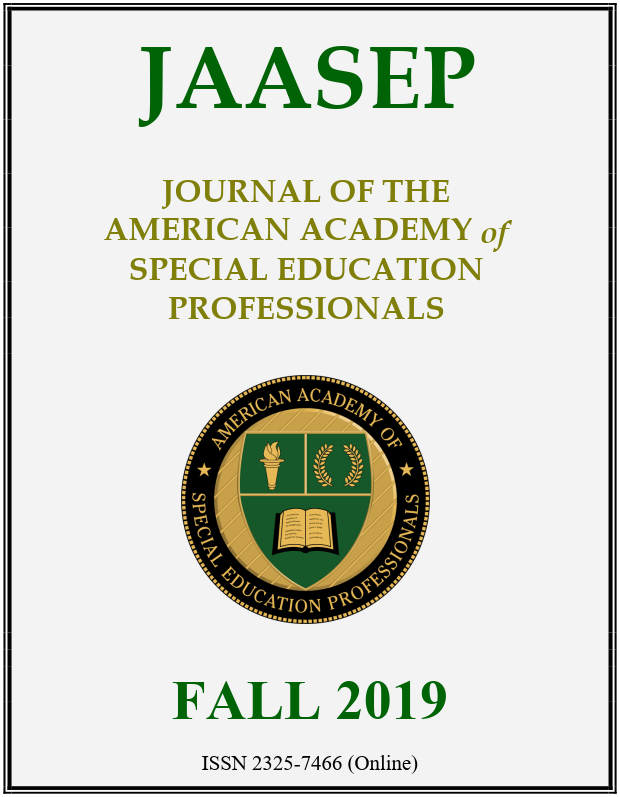Services and Supports for Individuals with Autism Spectrum Disorders in the Kingdom of Saudi Arabia
Abed, M. G., & Alrawajfh, S. (2017). Elementary school teachers' attitude towards including students with special educational needs into regular public schools in Saudi Arabia. International Journal of Education, 9(1), 49-66. DOI: https://doi.org/10.5296/ije.v9i1.10915
AL-Amodi Autism Research Chair (AARCh). (n.d.). AL-Amodi Autism Research Chair (AARCh). Retrieved from http://c.ksu.edUSAa/aarchair/en
Alamri, A. (2016). Teachers’ attitudes towards children with autism: A comparative study of the United States and Saudi Arabia. Journal of the International Association of Special Education, 16(1), 14-25.
Almasoud H. Services and support for individuals with autism: a comparative study between the UK and Saudi Arabia; (2010a). Retrieved from http://faculty.ksu.edu.sa/almasoud/DocLib29/Services%20and%20support%20for%20autistic%20people%D8%A3.%20%D8%AD%D9%86%D8%A7%D9% 86%20%D8%B9%D9%84%D9%8A%20%D8%A7%D9%84%D9%85% D8%B3%D8%B9%D9%88%D8%AF.pdf
Almasoud, H. (2010b). The Education of Children with autism in Saudi Arabia: A Teaching Guide. King Saud University. Retrieved from http://faculty.ksu.edUSAa/almasoud/DocLib29/The%20Education%20of%20Children%20with%20autism%20in%20Saudi.pdf
Al-Mousa, N. A. (2010). The experience of the kingdom of Saudi Arabia in mainstreaming students with special educational needs in public schools. Saudi Arabia: The Arab Bureau of Education for the Gulf States Riyadh/UNESCO.
Al-Mulhim, A. (2014, May 19). Need for special education centers in KSA. Arab News. Retrieved from http://www.arabnews.com/news/573076
Alnahdi, G. H. (2014). Special education programs for students with intellectual disability in Saudi Arabia: Issues and recommendations. Journal of the International Association of Special Education, 15(1), 83-91.
Alnahdi, Ghaleb (2013). Transition services for students with mild intellectual disability in Saudi Arabia. Education and Training in Autism and Developmental Disabilities, 48(4), 531-544.
Alnemary, F. M., Aldhalaan, H. M., Simon-Cereijido, G., & Alnemary, F. M. (2017). Services for children with autism in the Kingdom of Saudi Arabia. The International Journal of Research and Practice, 21(5), 592-602. https://doi.org/10.1177/1362361316664868 DOI: https://doi.org/10.1177/1362361316664868
Alotaibi, F., & Almalki, N. (2016). Parents' perceptions of early interventions and related services for children with autism spectrum disorder in Saudi Arabia. International Education Studies, 9(10), 128-140. DOI: https://doi.org/10.5539/ies.v9n10p128
Al-Othman, I. (2002). Status of special education services for students with autism in Saudi Arabia (Order No. 3055380). Available from ProQuest Dissertations & Theses Global. (251672389). Retrieved from https://search-proquest-com.authenticate.library.duq.edu/docview/251672389?accountid=10610
Alqahtani, M. M. J. (2012). Understanding autism in Saudi Arabia: A qualitative analysis of the community and cultural context. Journal of Pediatric Neurology, 10(1), 15-22. Retrieved from https://search-proquest-com.authenticate.library.duq.edu/docview/1022704997?accountid=10610
Alquraini, Turki (2011). Special education in Saudi Arabia: Challenges, perspectives, future possibilities. International Journal of Special Education. 26(2), 149-159.
Al-Salehi, S. & Ghaziuddin, M. (2009). G6PD deficiency in autism: a case-series from Saudi Arabia. European Child & Adolescent Psychiatry, 18(4), 227-230. doi:10.1007/s00787-008-0721-9. DOI: https://doi.org/10.1007/s00787-008-0721-9
Al-Salehi, S. M., Al-Hifthy, E. H., & Ghaziuddin, M. (2009). Autism in Saudi Arabia: presentation, clinical correlates and comorbidity. Transcultural Psychiatry, 46(2), 340-347. DOI: https://doi.org/10.1177/1363461509105823
Amr, M., Ali, W. B., Hablas, H., Raddad, D., El-Mehesh, F., El-Gilany, A. H., & Al-Shamy, H. (2012). Sociodemographic factors in Arab children with autism spectrum disorders, Pan African Medical Journal, 13(1), 65, 1–11 DOI: https://doi.org/10.1016/j.rasd.2011.05.005
Babatin, A. M., Alzahrani, B. S., Jan, F. M., Alkarimi, E. H., & Jan, M. M. (2016). The availability of services for children with autism spectrum disorder in a Saudi population. Neurosciences, 21(3), 223–226. http://doi.org/10.17712/nsj.2016.3.20150597 DOI: https://doi.org/10.17712/nsj.2016.3.20150597
Eid, A. M., Aljaser, S. M., AlSaud, A. N., Asfahani, S. M., Alhaqbani, O. A., Mohtasib, R. S., ... & Fryling, M. (2017). Training parents in Saudi Arabia to implement discrete trial teaching with their children with autism spectrum disorder. Behavior Analysis in Practice, 10(4), 402–406. DOI: https://doi.org/10.1007/s40617-016-0167-3
El-Ansary, A. & Al-Ayadhi, L. (2012). Neuroinflammation in autism spectrum disorders. Journal of Neuroinflammation, 9(1), 265-273. doi:10.1186/1742-2094-9-265. DOI: https://doi.org/10.1186/1742-2094-9-265
Finn, J. D., Suriani, A. E., & Achilles, C. M. (2007, November). Small classes in the early grades: One policy–multiple outcomes. Paper presented at National Invitational Conference of the Early Childhood Research Collaborative, Minneapolis, MN. Retrieved from http://archive.scottish.parliament.uk/s3/committees/ellc/inquiries/documents/FinnProfessorJ.pdf
Haimour, A. I., & Obaidat, Y. F. (2013). School teachers' knowledge about autism in Saudi Arabia. World Journal of Education, 3(5), 45-56. DOI: https://doi.org/10.5430/wje.v3n5p45
Hussein, H., & Taha, G. R. (2013). Autism spectrum disorders: a review of the literature from Arab countries. Middle East Current Psychiatry, 20(3), 106-116. DOI: https://doi.org/10.1097/01.XME.0000430433.49160.a4
King Salman Center for Disability Research. (2000). System of care for the disabled in Kingdom of Saudi Arabia. Retrieved from http://www.kscdr.org.sa/ar/disability-code
Kopetz, P. B., & Endowed, E. D. L. (2012). Autism worldwide: Prevalence, perceptions, acceptance, action. Journal of Social Sciences, 8(2), 196. The Saudi Autistic Society. (n.d.). Saudi Autistic Society. July 23, 2014. Retrieved from http://saudiautism.com/english/index.php?option=com_content&view=article&id=25:the-saudi-Autistic-society-&catid=31:general&Itemid=28 DOI: https://doi.org/10.3844/jssp.2012.196.201
